AVEVA Group Bundle
Who Really Owns AVEVA Group?
Understanding a company's ownership is crucial for investors and strategists alike. The AVEVA Group SWOT Analysis reveals how ownership changes have reshaped this global leader in industrial software. From its roots in government research to its current position, AVEVA's ownership story is a fascinating case study in corporate evolution.
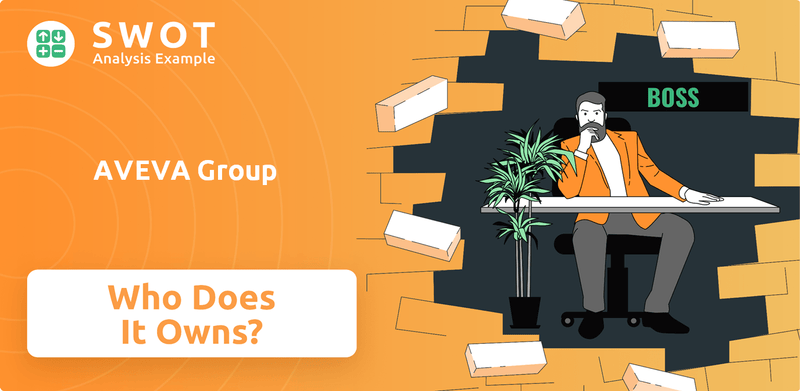
The most significant shift in the AVEVA ownership occurred with the AVEVA acquisition by Schneider Electric in 2023. This move fundamentally altered the AVEVA Group structure, transforming it into a wholly-owned subsidiary. This exploration will provide insights into the AVEVA company journey, examining its AVEVA shareholders, AVEVA history, and the implications of this significant corporate event.
Who Founded AVEVA Group?
The story of the AVEVA Group begins in 1967, rooted in the establishment of the Computer-Aided Design Centre (CADCentre) in Cambridge, England. Initially a government-funded research institute, its primary goal was to foster the development and application of computer-aided design techniques for the British industry.
Early leadership included Arthur Llewelyn, the first director, who outsourced staff recruitment to ICL. Key figures like Dick Newell and Martin Newell played crucial roles, with Dick Newell notably leading the creation of the Plant Design Management System (PDMS), a groundbreaking 3D design system released in 1976.
The transformation of the CADCentre into a private entity occurred in 1983, followed by a management buyout in 1994, spearheaded by Dr. Bob Bishop. The company went public in 1996 and rebranded as AVEVA in 2001. Information on specific equity splits or shareholdings of the founders at inception is not publicly available due to its initial status as a government-funded research institute.
AVEVA was founded in 1967 as the Computer-Aided Design Centre (CADCentre).
Arthur Llewelyn was the first director. Dick Newell led the development of PDMS.
The CADCentre became a private company in 1983 and underwent a management buyout in 1994.
AVEVA became a publicly listed company in 1996.
The company changed its name to AVEVA in 2001.
Early backing included Summit Partners, starting in 1993, and a grant from the European Union in 2016.
Understanding the AVEVA ownership structure begins with its origins as a government-backed research entity. The transition to a private and then public company marks a significant shift in its AVEVA company profile. The early involvement of key figures like Arthur Llewelyn and Dick Newell shaped the company's direction. For more insights, consider reading about the Marketing Strategy of AVEVA Group.
- AVEVA Group's history is rooted in the CADCentre, established in 1967.
- The company evolved from a government-funded research institute to a publicly traded entity.
- Key individuals like Dick Newell played crucial roles in product development.
- Early funding rounds included backing from Summit Partners.
AVEVA Group SWOT Analysis
- Complete SWOT Breakdown
- Fully Customizable
- Editable in Excel & Word
- Professional Formatting
- Investor-Ready Format
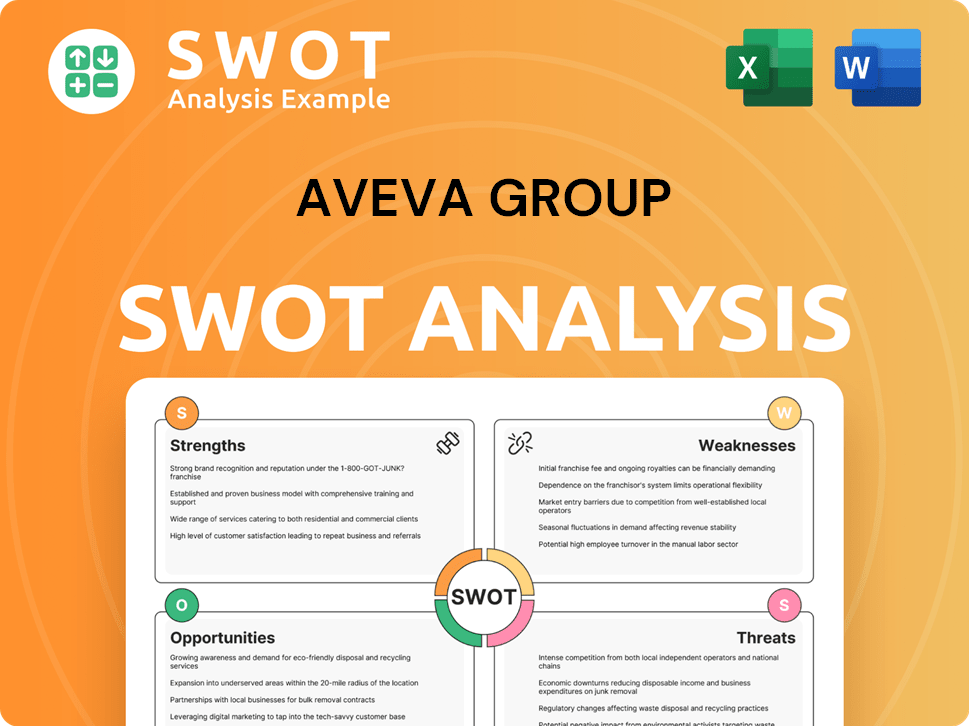
How Has AVEVA Group’s Ownership Changed Over Time?
The ownership of the AVEVA Group, now a wholly-owned subsidiary of Schneider Electric, has seen a significant transformation. Initially stemming from a government-funded research institute, the AVEVA company transitioned to private ownership in 1983, followed by its listing on the London Stock Exchange in 1996. This marked the beginning of a new chapter for AVEVA shareholders, as the company navigated the public market for over two decades.
A pivotal moment occurred on March 1, 2018, when AVEVA Group merged with Schneider Electric's industrial software business. This reverse takeover established Schneider Electric as the majority shareholder, holding a 60% stake. Further expansion came with the acquisition of OSIsoft in 2021, which was a strategic move to strengthen AVEVA's position in the industrial software market. The final phase of this ownership evolution concluded on January 18, 2023, when Schneider Electric completed the full AVEVA acquisition, making AVEVA a wholly-owned entity.
| Event | Date | Impact on Ownership |
|---|---|---|
| Privatization | 1983 | Transition from government-funded research to a private entity. |
| Initial Public Offering (IPO) | 1996 | Listed on the London Stock Exchange, opening ownership to the public. |
| Merger with Schneider Electric's Industrial Software Business | March 1, 2018 | Schneider Electric becomes the largest shareholder (60% ownership). |
| Acquisition of OSIsoft | March 19, 2021 | AVEVA issues shares to OSIsoft's founder, Patrick Kennedy, who holds a 4.5% stake. |
| Full Acquisition by Schneider Electric | January 18, 2023 | Schneider Electric acquires the remaining shares, making AVEVA a wholly-owned subsidiary. |
The complete AVEVA ownership by Schneider Electric, finalized in early 2023, valued the entire company at approximately £9.48 billion. This acquisition, executed through a Court-approved scheme of arrangement, resulted in a share price of £31 per share. Despite this full integration, Schneider Electric has expressed intentions to preserve AVEVA's business autonomy, future R&D investment, and distinct software company culture, as highlighted in the Growth Strategy of AVEVA Group.
The evolution of AVEVA's ownership reflects a strategic journey through various stages of corporate development, from public to private control.
- Schneider Electric's full acquisition of AVEVA in January 2023 marked the end of AVEVA's independent public listing.
- The OSIsoft acquisition in 2021 enhanced AVEVA's position in the industrial software market.
- The reverse takeover in 2018 by Schneider Electric was a critical step in the company's ownership evolution.
- AVEVA's history includes significant shifts in ownership, from public to private, and strategic acquisitions.
AVEVA Group PESTLE Analysis
- Covers All 6 PESTLE Categories
- No Research Needed – Save Hours of Work
- Built by Experts, Trusted by Consultants
- Instant Download, Ready to Use
- 100% Editable, Fully Customizable
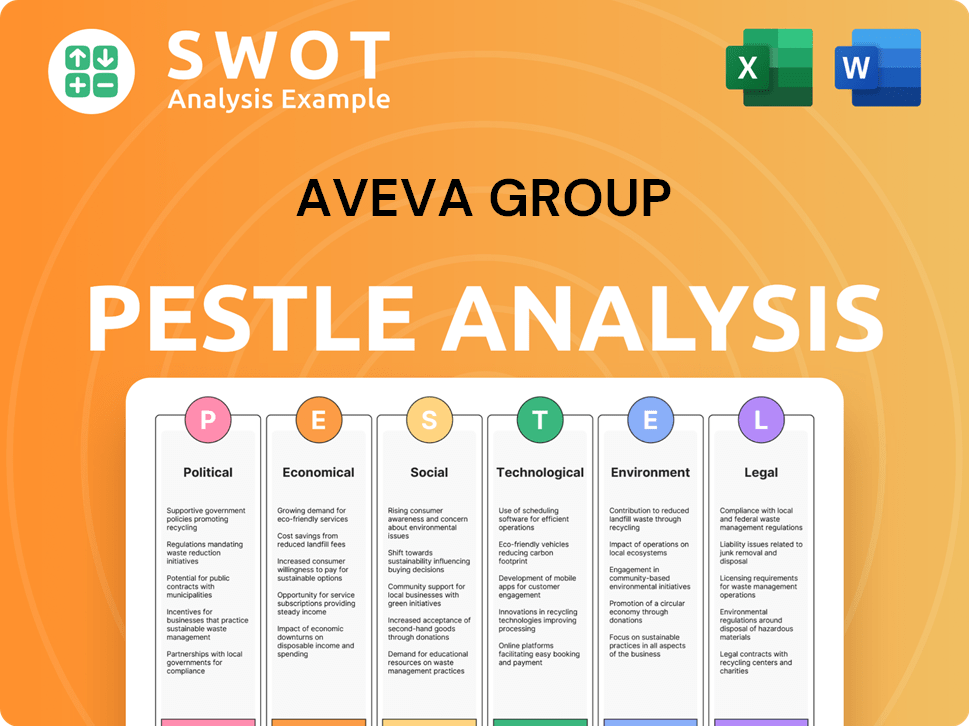
Who Sits on AVEVA Group’s Board?
As of early 2025, the Board of Directors of AVEVA Group, a wholly-owned subsidiary of Schneider Electric, reflects its parent company's influence. The board includes key figures such as Caspar Herzberg as Chief Executive Officer, appointed on February 28, 2023, and directors Clement Bresson and Brian DiBenedetto, appointed in late 2024. Other board members include Caoimhe Keogan (Human Resources Officer) and Rashesh Mody (Chief Operating Officer), along with recently appointed non-executive directors. This structure ensures that the AVEVA company continues to operate under the strategic direction of Schneider Electric.
The board has seen recent changes, with Peter Herweck, formerly CEO, serving as Chairman until September 2024. Additional directors appointed in late 2024 include Clement Jean Charles Florent Bresson and Ségoléne Simonin-Du Boullay. The composition of the board reflects the integration of AVEVA within Schneider Electric's structure while maintaining a degree of operational autonomy. The board's decisions are ultimately influenced by Schneider Electric, which holds complete AVEVA ownership.
| Board Member | Title | Appointment Date |
|---|---|---|
| Caspar Herzberg | Chief Executive Officer | February 28, 2023 |
| Clement Bresson | Director | November 19, 2024 |
| Brian DiBenedetto | Director | September 25, 2024 |
| Caoimhe Keogan | Human Resources Officer | N/A |
| Rashesh Mody | Chief Operating Officer | N/A |
The voting power within AVEVA Group has shifted significantly due to the acquisition by Schneider Electric. Before the full acquisition, the voting structure was based on a one-share-one-vote principle. However, Schneider Electric's initial majority stake of 60% gave it substantial control. In the November 2022 vote for the full acquisition, Schneider Electric, as the majority shareholder, voted in favor. The acquisition required approval from at least 75% of minority shareholders, with the vote results showing 83.49% of Scheme Shares voted in favor at the Court Meeting and 83.91% at the General Meeting, demonstrating strong support for the acquisition. This shift has consolidated control, making Schneider Electric the ultimate decision-maker regarding AVEVA shareholders.
The Board of Directors of AVEVA Group is now under the control of Schneider Electric, following the full AVEVA acquisition.
- The board includes key executives and directors.
- Schneider Electric holds complete control over the company.
- The voting structure has changed significantly since the acquisition.
- AVEVA maintains its brand and operational autonomy.
AVEVA Group Business Model Canvas
- Complete 9-Block Business Model Canvas
- Effortlessly Communicate Your Business Strategy
- Investor-Ready BMC Format
- 100% Editable and Customizable
- Clear and Structured Layout
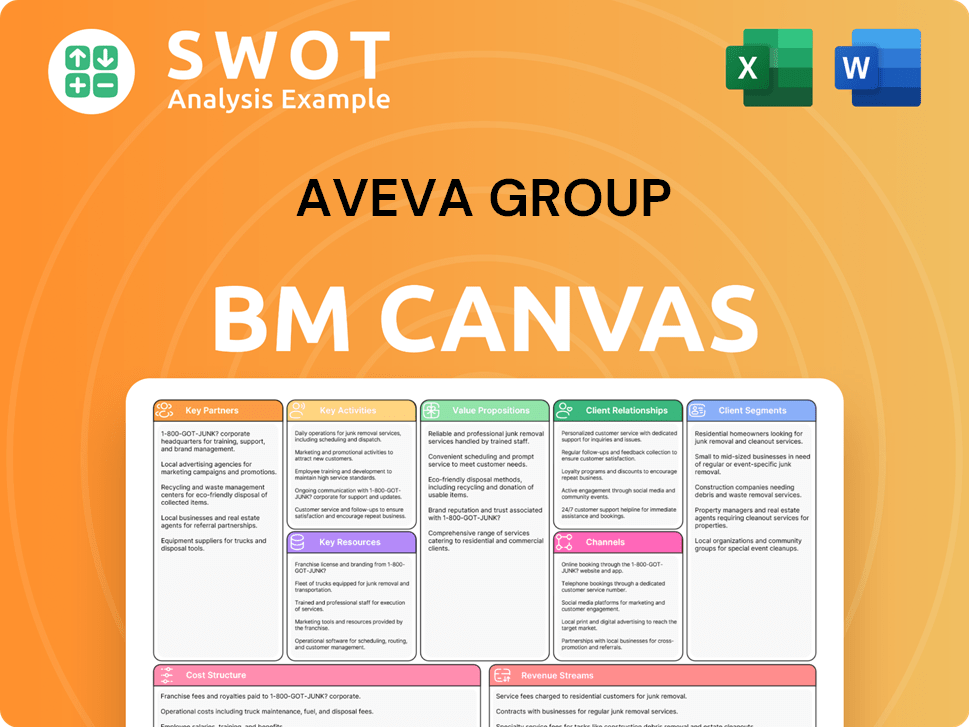
What Recent Changes Have Shaped AVEVA Group’s Ownership Landscape?
In the past few years, the ownership of the AVEVA Group has seen significant shifts, primarily driven by Schneider Electric. Schneider Electric initially held a 60% stake in 2018. A major strategic move was the AVEVA acquisition of OSIsoft in March 2021, valued at US$5 billion, which aimed to enhance AVEVA's position in industrial software and data management.
The most impactful change was Schneider Electric's complete acquisition of AVEVA on January 18, 2023, for £9.5 billion. This deal resulted in AVEVA becoming a wholly-owned subsidiary of Schneider Electric and its delisting from the London Stock Exchange. This move was aimed at integrating AVEVA's industrial software capabilities with Schneider Electric's energy management expertise. This strategic consolidation reflects a trend in the industrial software sector.
| Year | Event | Impact |
|---|---|---|
| 2018 | Schneider Electric acquired a 60% stake | Initial control by Schneider Electric |
| March 2021 | Acquisition of OSIsoft | Strengthened position in industrial software and data management |
| January 18, 2023 | Full acquisition by Schneider Electric | AVEVA became a wholly-owned subsidiary, delisting from the London Stock Exchange |
Post-acquisition, AVEVA's focus has been on transitioning to a Software-as-a-Service (SaaS) and subscription-based business model. As of June 30, 2024, AVEVA reported a 16% growth in Annualized Recurring Revenue (ARR), primarily from SaaS wins, indicating a successful shift. Schneider Electric's 2024 full-year earnings call in February 2025 also reported a 15% growth in AVEVA Group's ARR for 2024, confirming the ongoing subscription transition. The Target Market of AVEVA Group article provides further insights into the company's strategic direction.
Schneider Electric's full acquisition in January 2023 marked a significant change.
The acquisition of OSIsoft in March 2021 was a strategic move.
Focus on SaaS and subscription models is a key strategic direction.
Schneider Electric's influence has been steadily increasing.
AVEVA is now a wholly-owned subsidiary.
Industry consolidation is a notable trend.
ARR growth of 16% as of June 30, 2024.
ARR grew 15% in 2024, according to Schneider Electric.
Focus on SaaS is driving revenue model changes.
Digital transformation and industrial AI are key areas.
Investment in R&D continues.
Business autonomy under Schneider Electric is maintained.
AVEVA Group Porter's Five Forces Analysis
- Covers All 5 Competitive Forces in Detail
- Structured for Consultants, Students, and Founders
- 100% Editable in Microsoft Word & Excel
- Instant Digital Download – Use Immediately
- Compatible with Mac & PC – Fully Unlocked
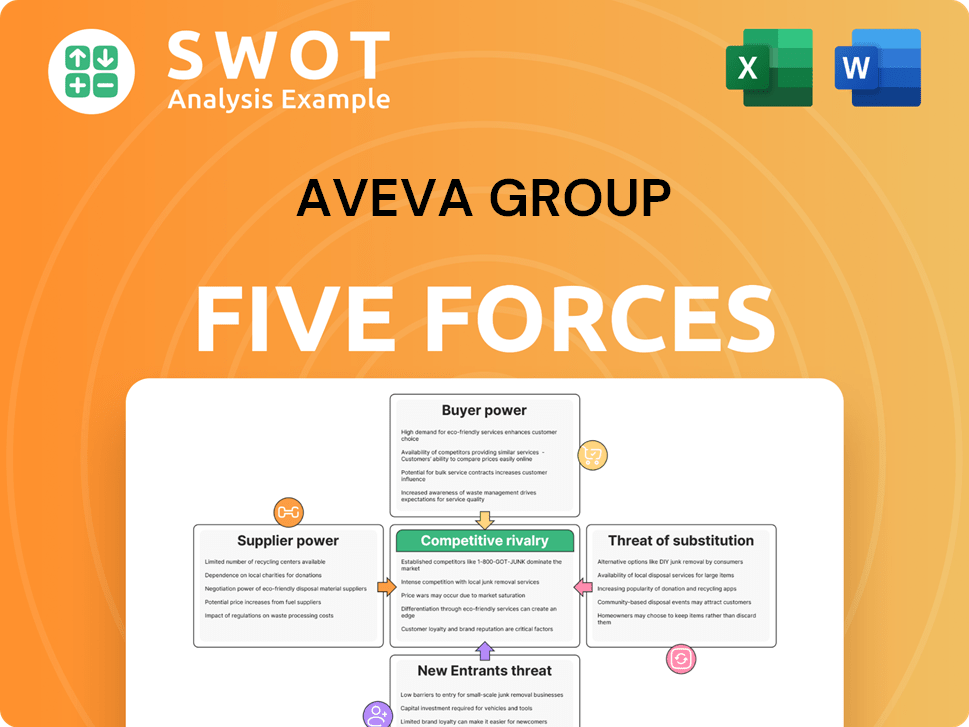
Related Blogs
- What are Mission Vision & Core Values of AVEVA Group Company?
- What is Competitive Landscape of AVEVA Group Company?
- What is Growth Strategy and Future Prospects of AVEVA Group Company?
- How Does AVEVA Group Company Work?
- What is Sales and Marketing Strategy of AVEVA Group Company?
- What is Brief History of AVEVA Group Company?
- What is Customer Demographics and Target Market of AVEVA Group Company?
Disclaimer
All information, articles, and product details provided on this website are for general informational and educational purposes only. We do not claim any ownership over, nor do we intend to infringe upon, any trademarks, copyrights, logos, brand names, or other intellectual property mentioned or depicted on this site. Such intellectual property remains the property of its respective owners, and any references here are made solely for identification or informational purposes, without implying any affiliation, endorsement, or partnership.
We make no representations or warranties, express or implied, regarding the accuracy, completeness, or suitability of any content or products presented. Nothing on this website should be construed as legal, tax, investment, financial, medical, or other professional advice. In addition, no part of this site—including articles or product references—constitutes a solicitation, recommendation, endorsement, advertisement, or offer to buy or sell any securities, franchises, or other financial instruments, particularly in jurisdictions where such activity would be unlawful.
All content is of a general nature and may not address the specific circumstances of any individual or entity. It is not a substitute for professional advice or services. Any actions you take based on the information provided here are strictly at your own risk. You accept full responsibility for any decisions or outcomes arising from your use of this website and agree to release us from any liability in connection with your use of, or reliance upon, the content or products found herein.